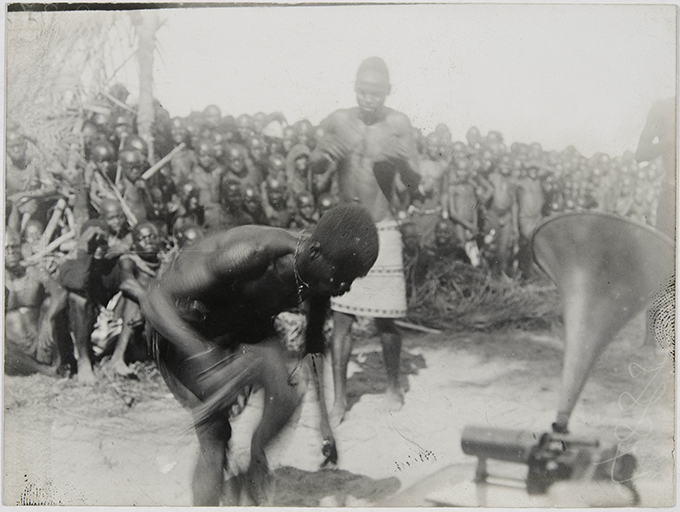
Between 1909 and 1915, over the course of four anthropological surveys in Nigeria and Sierra Leone, Northcote Thomas made about 750 sound recordings using a wax cylinder phonograph. He recorded samples of speech (for linguistic analysis), stories, songs and musical instruments.
To date, we have found just one photograph that shows Thomas’s phonograph in use in the field. This photograph was taken in Agila (then spelled ‘Agala’), in present-day Benue State, and is captioned in Thomas’s photo register merely as ‘dancing’. Thomas made only a few sound recordings in Agila, all on 4th June 1913, including this one of a female vocal group (British Library C51/3222).
Northcote Thomas’s recording ‘ident’ can be heard at the beginning of the track, ‘Agala, June the 4th, 1913’, followed by the womens’ song. It is likely this was recorded as part of the session captured on the photograph in front of a large group of local spectators (including lots of children), who were no doubt intrigued by the strange presence of the ‘Government Anthropologist’ in their town.
Although Thomas’s third anthropological survey, which took place in 1912-13, was intended to focus on Igbo-speaking communities in what was then Asaba District, west of the Niger River, he also spent three months travelling to towns in eastern Igbo areas, including Owerri, Aba, Ikot Ekpene, Afikpo, Obubra, Ikom, Agila and Nkalagu.
Incidentally, from the photograph we have been able to identify the Thomas’s phonograph as a Pathé ‘Coq’ model. It is likely that it was supplied by Lily Frazer (wife of the anthropologist J. G. Frazer), who supplied sound recording equipment to field researchers and provided a phonograph duplication service.